Number of Blacks Earning Doctorates in 2007 Increases by 10 Percent From the Previous Year and Nears an All-Time High
Using data from the National Science Foundation, the National Opinion Research Center at the University of Chicago reports that 1,821 African Americans earned doctoral degrees at U.S. universities in 2007. This is an increase of 10 percent from 2006 and reverses two years of declines in the number of blacks earning doctorates.
The number of blacks earning doctorates in 2007 was close to the all-time high of 1,869 achieved in 2004.
In 2007 African Americans earned 6.6 percent of all doctorates awarded to U.S. citizens. This was up from 6.2 percent in 2006.

Meharry Medical Students Buck the Trend Toward Increased Specialization
 According to a recent survey published in the Journal of the American Medical Association, only 2 percent of the students currently enrolled in U.S. medical schools plan a career in primary care. These general practitioners tend to be at the low end of the earnings scale for medical doctors. On average they earn about $100,000 when they start out after completing their medical training. In contrast, students choosing to specialize can earn a starting income of $250,000 or more with earnings potential in the millions of dollars. This pay gap is resulting in an acute shortage of primary care physicians. According to a recent survey published in the Journal of the American Medical Association, only 2 percent of the students currently enrolled in U.S. medical schools plan a career in primary care. These general practitioners tend to be at the low end of the earnings scale for medical doctors. On average they earn about $100,000 when they start out after completing their medical training. In contrast, students choosing to specialize can earn a starting income of $250,000 or more with earnings potential in the millions of dollars. This pay gap is resulting in an acute shortage of primary care physicians.
But at Meharry Medical College, the historically black educational institution in Nashville, more than one half of all students are preparing for a career in primary care medicine. Meharry, founded in 1876, currently enrolls more than 700 medical students. Its mission is not only to increase the number of black doctors but to provide more physicians dedicated to community-based health services and to eliminate racial health disparities.


Tenure/Tenure-Track Faculty Positions
Queens University of Charlotte is an independent, co-educational comprehensive university affiliated with the Presbyterian Church. It is located in a beautiful, park-like setting in the heart of Charlotte, North Carolina.
The University serves over 2,300 traditional and evening undergraduates and graduate students through the College of Arts and Sciences, McColl School of Business, School of Communication, Wayland H. Cato Jr. School of Education and Presbyterian School of Nursing.
The university is especially interested in qualified candidates who can contribute, through their research, teaching, and/or service, to the diversity and excellence of the academic community. Queens is an equal opportunity employer and encourages applications from underrepresented groups including minorities, women, and persons with disabilities.
Queens University of Charlotte invites applications for the following tenure-tenure track faculty positions to begin August 15, 2009.
College of Arts and Sciences
- Assistant Professor of Art (Graphic Arts)
- Assistant Professor of Biology
- Assistant Professor of Music (Music Therapy)
- Assistant Professor of Political Science / International Studies
- Assistant Professor of Spanish
- Assistant/Associate Professor of Spanish and Department Chair
- Assistant Professor of Psychology
- Assistant Professor of Sociology
McColl School of Business
- Assistant/Associate Professor of Finance
School of Communication
- Assistant/Associate Professor of Communication (Journalism)
- Assistant/Associate Professor of Communication (Organizational/Corporate)
Wayland H. Cato, Jr. School of Education
- Assistant Professor of Education
Presbyterian School of Nursing
- Assistant Professor of Nursing
For details on each position and the application process see http://www.queens.edu/queens/hr/careers.asp

New Dean Looks to Resurrect the Howard University School of Divinity
 Although he has been on the job for a year, Alton B. Pollard III was formally installed last month as dean of the Howard University School of Divinity. Before his appointment last year, the divinity school had been without a permanent dean for five years. Enrollment was down and the school’s campus, which sits apart from the main campus of Howard University, had fallen into disrepair. Although he has been on the job for a year, Alton B. Pollard III was formally installed last month as dean of the Howard University School of Divinity. Before his appointment last year, the divinity school had been without a permanent dean for five years. Enrollment was down and the school’s campus, which sits apart from the main campus of Howard University, had fallen into disrepair.
Pollard has a grand vision for the 141-year-old school. He wants to broaden the ethnic makeup of the student body and to bring in more students from different religions and religious backgrounds. Pollard wants to reinvigorate the school’s relationships with area churches. He plans to increase the size of the faculty and to rewrite the curriculum for the first time in two decades. He hopes to establish a Ph.D. program and to offer joint degrees with the law, medical, and business schools at Howard.
Pollard came to Howard from the Candler School of Theology at Emory University in Atlanta. He is a graduate of Fisk University and holds a master’s degree from Harvard University and a Ph.D. from Duke University.
New Minority Scholarship at Business School of Indiana University
 The Kelley School of Business at Indiana University received a $15 million donation from William R. Fry, a retired banker and investment entrepreneur who also owned a network of radio stations. The money will be used to create an endowment that will provide scholarships for underrepresented minority students. Initially five to 10 students will be accepted into the Fry Scholars Program. But eventually 80 or more students will be receiving Fry Scholarships each year. The Kelley School of Business at Indiana University received a $15 million donation from William R. Fry, a retired banker and investment entrepreneur who also owned a network of radio stations. The money will be used to create an endowment that will provide scholarships for underrepresented minority students. Initially five to 10 students will be accepted into the Fry Scholars Program. But eventually 80 or more students will be receiving Fry Scholarships each year.
Edwin C. Marshall, vice president for diversity, equity, and multicultural affairs at Indiana University, stated in announcing the scholarship program, “To be fully competitive in today’s and tomorrow’s environments, Indiana University and the Kelley School must be able to attract and educate a student body that reflects the diverse culture of our global society. Mr. Fry’s generosity will help make this a reality.”
University of Washington’s Online Treasure Trove of Historical Information on the Ku Klux Klan in Seattle
A new online project at the University of Washington offers a detailed look at the Ku Klux Klan in Washington State. The site includes never-before published photographs, news clippings from mainstream media, excerpts from the Klan’s Seattle-based newspaper, Watcher on the Tower, and a full history of the Klan in the state.
The new Klan Web pages are included in a larger online archive called the Seattle Civil Rights and Labor History Project. This extensive online project has many interesting sections including entries on racial housing segregation in Seattle, the black protest movement at the University of Washington, the Black Panther movement in Washington State, the history of blacks in Seattle, and civil rights protest movements in the state.
Readers who would like to view this interesting online archive can do so by clicking here.
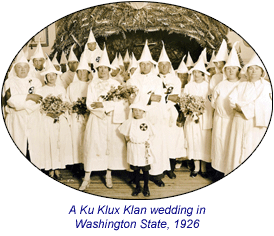
University of Michigan Engineer Creates “Nanobamas”
John Hart, an assistant professor of mechanical engineering at the University of Michigan, has created three-dimensional images of President-elect Obama that are smaller than a grain of salt. He calls them “Nanobamas.”
 His objective was to raise awareness of nanotechnology among students and faculty. Each image of the president-elect contains about 150 carbon nanotubes that are stacked together like trees in a forest. Each nanotube is about 1/50,000th of the width of a human hair. His objective was to raise awareness of nanotechnology among students and faculty. Each image of the president-elect contains about 150 carbon nanotubes that are stacked together like trees in a forest. Each nanotube is about 1/50,000th of the width of a human hair.
The nanotechnology can be used in many practical applications including electronics, energy storage devices, and high performance materials.
Professor Hart has created other nano-art which he showcases online. To view this gallery click here.
Gilman Scholars Increase the Racial Diversity of College Students Who Study Abroad
 The Benjamin A. Gilman International Scholarship Program is sponsored by the Educational and Cultural Affairs Bureau of the U.S. State Department. The scholarships provide up to $5,000 to disadvantaged students who wish to study abroad for a semester when they are in college. This year about 1,200 students will receive the scholarship awards. The Benjamin A. Gilman International Scholarship Program is sponsored by the Educational and Cultural Affairs Bureau of the U.S. State Department. The scholarships provide up to $5,000 to disadvantaged students who wish to study abroad for a semester when they are in college. This year about 1,200 students will receive the scholarship awards.
In the 2006-07 academic year, 120 African-American college students received Gilman scholarships for studying abroad. In 2007, 43 of 120 black Gilman scholars were students at historically black colleges and universities.
Blacks make up only 4 percent of all American college students who study abroad. But 15 percent of Gilman scholarship recipients are black. Therefore, it appears that the program is opening a door to scores of black students who otherwise would not be able to study abroad.
More than 70 Gilman scholars in the 2006-07 academic year used the funds to study in African nations. Nine percent of all Gilman scholars studied in Africa compared to just 3 percent of all American college students who studied abroad.
The number of black Gilman scholars has more than doubled in the 2005 to 2007 period.
Some 43 percent of the black students who applied for Gilman awards in 2007 were accepted into the program. For whites, the acceptance rate was only 30 percent.
The scholarship program was founded by the U.S. Congress and is administered by the Institute for International Education. Gilman was a congressman from New York who served for 15 terms until his retirement in 2003. He chaired the House Committee on International Relations.
Appointments
 • Wilberforce Kisamba-Mugerwa, chair of the National Planning Authority in Uganda, will serve as the Class of 1955 Visiting Professor of International Studies for the spring semester at Williams College in Massachusetts. He holds a Ph.D. from Makerere University. • Wilberforce Kisamba-Mugerwa, chair of the National Planning Authority in Uganda, will serve as the Class of 1955 Visiting Professor of International Studies for the spring semester at Williams College in Massachusetts. He holds a Ph.D. from Makerere University.
 • Cynthia Sellers was appointed vice president for student affairs at Tuskegee University in Alabama. She was executive assistant to the president and assistant professor of counseling at Hampton University in Virginia. • Cynthia Sellers was appointed vice president for student affairs at Tuskegee University in Alabama. She was executive assistant to the president and assistant professor of counseling at Hampton University in Virginia.
A graduate of Tuskegee University, Dr. Sellers holds a master’s degree from Tuskegee and a doctorate from Georgia State University.
 • Eric Anderson, associate professor of design at Carnegie Mellon University in Pittsburgh, was elected president of the board of directors and educational council of the Industrial Designers Society of America. He is the first African American to hold the position. • Eric Anderson, associate professor of design at Carnegie Mellon University in Pittsburgh, was elected president of the board of directors and educational council of the Industrial Designers Society of America. He is the first African American to hold the position.
Anderson is a graduate of the Philadelphia College of Art. He holds two master’s degrees from Ohio State University.
• Donald Small was named director of faculty development at Voorhees College in South Carolina. He was a professor of educational administration at South Carolina State University.
|
Black Acceptance Rates at the Nation’s Leading Liberal Arts Colleges
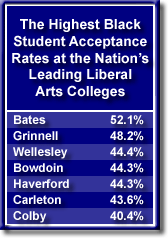 In many but not all cases, the percentage of black applicants who actually receive invitations to join the freshman class is a valuable gauge of an institution’s commitment to racial diversity. At 18 of the 27 high-ranking liberal arts colleges for which we obtained acceptance rate data this fall, the black acceptance rate was higher than the acceptance rate for nonblack applicants. In many but not all cases, the percentage of black applicants who actually receive invitations to join the freshman class is a valuable gauge of an institution’s commitment to racial diversity. At 18 of the 27 high-ranking liberal arts colleges for which we obtained acceptance rate data this fall, the black acceptance rate was higher than the acceptance rate for nonblack applicants.
In some cases the differences were very large. For example, at Bates College 52.1 percent of black applicants were admitted compared to 28.9 percent of all applicants to the college. At Bowdoin the black acceptance rate of 44.3 percent is significantly more than double the rate for all Bowdoin students, which stood at 18.6 percent.
But at Smith, Davidson, Bucknell, Bryn Mawr, Macalester, Barnard, Lafayette, Washington and Lee, and Harvey Mudd, the black student acceptance rate was below the rate prevailing for all students.
  |
“We don’t have quotas. We have aspirations.”
— Denise Askin, special assistant to the president for inclusiveness at Saint Anselm College in Manchester, New Hampshire, speaking of her goal to double black enrollments, in the Manchester Union Leader, 11-10-08 (See story below.)
|
Two U.S. University Professors Launch Library Building Campaign in Africa
Two university professors in the United States are heading up a nonprofit organization that hopes to build seven new libraries in Africa by the end of 2011. The first library is scheduled to open this month in Paga, Ghana, a small village that has about 15,000 inhabitants. The libraries are small shacks that will be stocked with books but, probably more important, will contain a satellite Internet terminal. The next library will be built in Liberia.
Building Libraries for Africa is the brainchild of Jahi U. Issa, an assistant professor of history at Delaware State University, and Salim Faraji, an assistant professor of African studies and history at California State University Dominguez Hills. The two professors hope to raise about $400,000 to complete this initial phase of the project.

For more information or to make an online donation to support the library building project, click here.
Stanford University Develops New Guidelines for Dealing With “Acts of Intolerance” on Campus
 Stanford University president John Hennessy recently signed an eight-page protocol document outlining how the university should react to “acts of intolerance” on campus. The new protocol adds intolerance incidents relating to age and gender identity to the previous list that included gender, race, ethnicity, disability, religion, nationality, and sexual orientation. Stanford University president John Hennessy recently signed an eight-page protocol document outlining how the university should react to “acts of intolerance” on campus. The new protocol adds intolerance incidents relating to age and gender identity to the previous list that included gender, race, ethnicity, disability, religion, nationality, and sexual orientation.
The new policy, formulated by a 24-member committee composed of students, administrators, residence hall officials, and the university’s general counsel, outlines the reporting process for students who have been victimized or who have witnessed acts of intolerance. The protocol also outlines mechanisms for the university to respond to such incidents and for establishing a consultation process to engage students and faculty in addressing such incidents.
Gerald Early Is the Editor of Two New Anthologies on African-American Fiction and Critical Essays
 Gerald L. Early, Merle Kling Professor of Modern Letters and director of the Center for the Humanities at Washington University in St. Louis, is the editor of two new book series published by Bantam/Dell. The inaugural Best African-American Fiction and Best African-American Essays will be out early next year in both hardcover and paperback. Gerald L. Early, Merle Kling Professor of Modern Letters and director of the Center for the Humanities at Washington University in St. Louis, is the editor of two new book series published by Bantam/Dell. The inaugural Best African-American Fiction and Best African-American Essays will be out early next year in both hardcover and paperback.
The fiction volume, which will be published annually, will contain short stories, excerpts from novels, and fiction for young readers. Contributors for the first volume include ZZ Packer, Edward P. Jones, and Helen Elaine Lee.
The essay volume, which also will be published annually, will include writings on art, entertainment, politics, science, and a wide variety of other topics. Contributors to the first anthology include Jamaica Kincaid, Walter Mosley, James McBride, K. Anthony Appiah, John McWhorter, Michael Eric Dyson, Thomas Sowell, and Stanley Crouch. Of particular note is an essay by Barack Obama entitled One Nation, Under God?
A Catholic College in New Hampshire Looks to Double Black Enrollments
 Blacks make up a mere one percent of the 2,000-member student body at Saint Anselm College in a Benedictine educational institution in Manchester, New Hampshire. But the president of the college, the Rev. Jonathan DeFelice, is committed to change. Blacks make up a mere one percent of the 2,000-member student body at Saint Anselm College in a Benedictine educational institution in Manchester, New Hampshire. But the president of the college, the Rev. Jonathan DeFelice, is committed to change.
Reverend DeFelice has vowed to double black enrollments. To do so, he has created a new post with the title, assistant to the president for inclusiveness. He has created faculty positions in African history and African-American literature. About a dozen courses are being offered this semester that fit into his “inclusiveness” directive. He has sent admissions officers to inner-city schools in Nashua, Concord, and Manchester in an effort to increase black applicants. And he applied for a state grant that will allow the college to conduct financial aid seminars that will be particularly helpful to black and other minority students.
Black Students at Berkeley:
Still Way Below the Level Prevailing Before the Ban on Affirmative Action Admissions
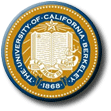 The University of California at Berkeley has released its final enrollment figures for the fall 2008 semester. There are 889 black undergraduate students on campus this fall. They make up 3.5 percent of the more than 25,000 undergraduates at Berkeley. Of the 889 black students, 547, or 61.5 percent, are women. The University of California at Berkeley has released its final enrollment figures for the fall 2008 semester. There are 889 black undergraduate students on campus this fall. They make up 3.5 percent of the more than 25,000 undergraduates at Berkeley. Of the 889 black students, 547, or 61.5 percent, are women.
Berkeley reports that there are 328 black graduate students on campus this fall. They make up 3.2 percent of all graduate students at Berkeley. Of the 328 black graduate students, 201, or 61.3 percent, are women.
Berkeley’s updated numbers show 146 black freshmen on campus this year, up 10 from a year ago. Blacks are 3.4 percent of the first-year class.
There are also 73 black students who transferred to Berkeley this fall. They make up 3.6 percent of all transfer students.
In the years before race-sensitive admissions were banned at Berkeley, blacks were on average more than 6 percent of all students.
  |
12.2% Percentage of all American households that had difficulty obtaining enough food in 2007.
22.2% Percentage of all African-American households that had difficulty obtaining enough food in 2007.
source: Centers for Disease Control and Prevention
|
Cornell University Debuts New Financial Aid Initiative
 In times of economic turmoil, many colleges and universities have instituted a hiring freeze and looked for ways to cut their budgets. But Cornell University recently sweetened its need-based financial aid programs for low-income students. In times of economic turmoil, many colleges and universities have instituted a hiring freeze and looked for ways to cut their budgets. But Cornell University recently sweetened its need-based financial aid programs for low-income students.
Under the new plan, Cornell will eliminate the parental contribution for all students who come from families with incomes under $60,000 a year. In addition, no Cornell student on financial aid will be saddled with loans of more than $7,500 as part of their scholarship package. Students from families with incomes from $60,000 to $75,000 will not have loans in their financial aid package. And students from families with incomes between $75,000 and $120,000 will have a loan cap of $3,000 per year.
Cornell has a financial aid budget of $138.9 million in the current academic year.

PURDUE UNIVERSITY NORTH CENTRAL

Assistant Professor of Business (Management)
The College of Business of Purdue University North Central in Westville, Indiana, is seeking an assistant professor for a ten month tenure-track appointment commencing August 17, 2009. The position involves teaching 11-14 contact hours per semester in undergraduate and graduate levels. The ideal candidate will be able to teach undergraduate introductory business courses, organization theory and operations management. Some courses may be required to be taught in the evenings, on-line or at off-campus locations including two correctional institutions. In the Saturday MBA program, teaching responsibilities may include organization behavior, operations management and strategy.
An earned doctorate in management or closely related field with strong teaching and scholarly experience is required. ABD’s nearing completion may be considered. Relevant professional experience would be a plus.
Applicants are to submit a cover letter expressing interest in the position, a resume documenting relevant academic and teaching experience, transcripts, as well as the names and contact information for at least three current references to:
Stephanie Wallace
College of Business
Purdue University North Central
1401 S. U.S. 421
Westville, IN 46391
FAX: 219-785-5528
swallace@pnc.edu
For full description see http://www.pnc.edu/pr/facfull.html
Purdue University North Central is an equal opportunity/equal access/affirmative action employer fully committed to achieving a diverse workforce.

Bob Jones University Apologizes for Its Racist Past
 Dozens of commentators and political pundits have pointed to the election of Barack Obama as president of the United States as a strong indication of improving race relations in the United States. But perhaps an even more striking sign of improving race relations is a recent statement issued by the president of Bob Jones University, the fundamentalist Bible college in Greenville, South Carolina, apologizing for the educational institution’s racist past. Dozens of commentators and political pundits have pointed to the election of Barack Obama as president of the United States as a strong indication of improving race relations in the United States. But perhaps an even more striking sign of improving race relations is a recent statement issued by the president of Bob Jones University, the fundamentalist Bible college in Greenville, South Carolina, apologizing for the educational institution’s racist past.
Bob Jones University did not admit black students until the 1970s and until 2000 it prohibited black and white students from dating.
In an eloquent statement, Stephen Jones, the fourth president of Bob Jones University, said recently, “For almost two centuries American Christianity, including BJU in its early stages, was characterized by the segregationist ethos of American culture. Consequently, for far too long, we allowed institutional policies regarding race to be shaped more directly by that ethos than by the principles and precepts of the Scriptures. We conformed to the culture rather than provide a clear Christian counterpoint to it.
“In so doing, we failed to accurately represent the Lord and to fulfill the commandment to love others as ourselves. For these failures we are profoundly sorry. Though no known antagonism toward minorities or expressions of racism on a personal level have ever been tolerated on our campus, we allowed institutional policies to remain in place that were racially hurtful.”
Honors and Awards
 • Alton Thompson, interim provost at North Carolina A&T State University in Greensboro, was elected into the Cooperative State Research, Education, and Extension Service’s Hall of Fame. • Alton Thompson, interim provost at North Carolina A&T State University in Greensboro, was elected into the Cooperative State Research, Education, and Extension Service’s Hall of Fame.
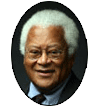 • James Lawson, Distinguished University Professor at Vanderbilt University, was honored with the unveiling of an official university portrait by artist Simmie Knox, who was commissioned to paint Bill Clinton’s official White House portrait. Lawson was expelled from Vanderbilt in 1960 for taking part in sit-ins to protest racially segregated lunch counters in Nashville. • James Lawson, Distinguished University Professor at Vanderbilt University, was honored with the unveiling of an official university portrait by artist Simmie Knox, who was commissioned to paint Bill Clinton’s official White House portrait. Lawson was expelled from Vanderbilt in 1960 for taking part in sit-ins to protest racially segregated lunch counters in Nashville.
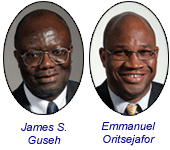 • James S. Guseh, professor of public administration, and Emmanuel Oritsejafor, an associate professor of political science, both at North Carolina Central University in Durham, were given the Lawrence Dunbar Reddick Memorial Scholarship Award for their article published in the Journal of Third World Studies entitled, “Government Size, Political Freedom, and Economic Growth in Nigeria, 1960-2000.” • James S. Guseh, professor of public administration, and Emmanuel Oritsejafor, an associate professor of political science, both at North Carolina Central University in Durham, were given the Lawrence Dunbar Reddick Memorial Scholarship Award for their article published in the Journal of Third World Studies entitled, “Government Size, Political Freedom, and Economic Growth in Nigeria, 1960-2000.”
 • Yolanda Wimberly, assistant professor of clinical pediatrics at the Morehouse School of Medicine, received the Humanism in Medicine Award from the American Association of Medical Colleges. • Yolanda Wimberly, assistant professor of clinical pediatrics at the Morehouse School of Medicine, received the Humanism in Medicine Award from the American Association of Medical Colleges.
A chemistry graduate of the University of Memphis, Dr. Wimberly earned a master’s degree in epidemiology from the University of Cincinnati. She received her medical training at Meharry Medical College.
|
 .
.